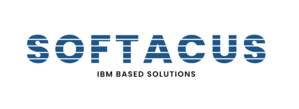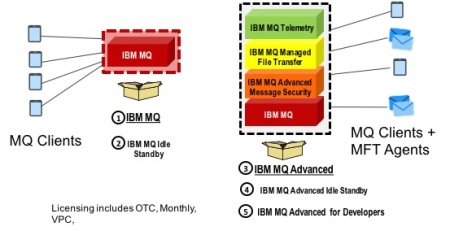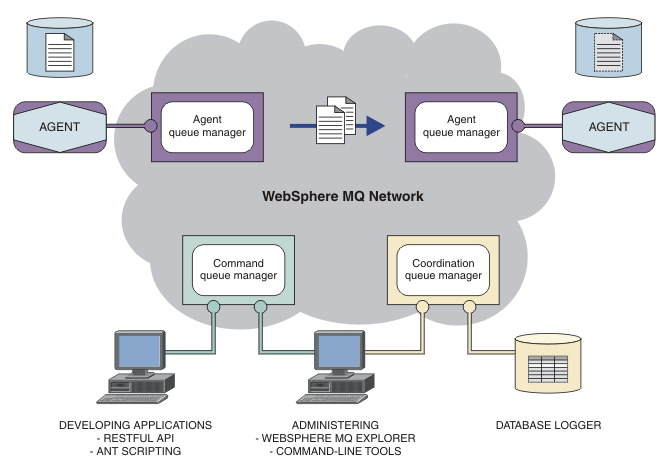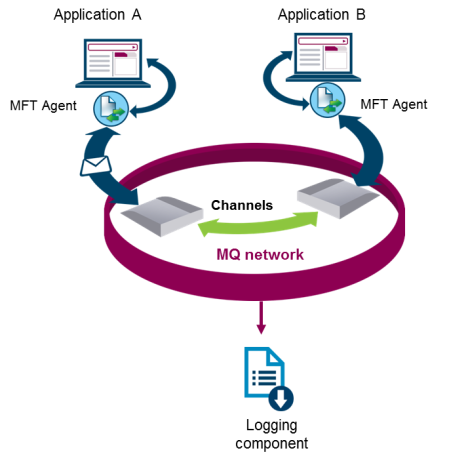Displaying items by tag: IBM MQ Advanced Comparison
Introduction
IBM MQ is the gold standard for enterprise messaging, providing security-rich and reliable messaging on-premises and across multiple clouds. IBM MQ allows independent and potentially non-concurrent applications on a distributed system to securely communicate with each other, using messages.
What it does
Business Manager Introduction to IBM MQ
IBM MQ v 9 Overview
Why you should choose IBM
Editions
MQ speaks your language
IBM MQ thrives at integrating different applications across multiple platforms. It supports a wide range of APIs and languages. IBM MQ enables the server infrastructure to be run across desktops, mainframes, and, now — cloud frameworks.

Articles
Comparison:
https://www.ibm.com/support/knowledgecenter/en/SSFKSJ_9.0.0/com.ibm.mq.pro.doc/q126140_.html
Licensing
IBM MQ Licensing
IBM MQ is licensed based on PVU. A Processor Value Unit (PVU) is a unit of measure used to differentiate licensing of software on distributed processor technologies (defined by Processor Vendor, Brand, Type and Model Number). IBM continues to define a processor, for purposes of PVU-based licensing, to be each processor core on a chip (socket). Each software program has a unique price per PVU.
The IBM MQ can run only on 1-2 cores. The more cores you use the more PVUs you will need.
The Number of PVUs is depending on several factors like:
- How many messages will be sent?
- How many systems do we need to connect to?
Development and Test Purposes
For Dev and Test Purposes you can free of charge the fully functional IBM MQ Advanced for Developers as long as you accept and adhere to license terms.
IBM MQ Advanced for Developers is available as a free download for development purposes and provides the full set of capabilities available with IBM MQ Advanced.
MQ is only free for development purposes and not free for tests of the real scenarios like test environment
If the Program is designated as for "Developers", the Program can only be deployed as part of Licensee's internal development and unit testing on a developer machine. A developer machine is a physical or virtual desktop environment, running a primary operating system and the Program, both of which are accessible and used by no more than one specified developer. Licensee is not authorized to use the Program for processing production workloads, simulating production workloads, or testing the scalability of any code, application, or system. Licensee is not authorized to use any part of the Program for any other purposes without acquiring the appropriate production entitlements.
High Availability Licensing
High Availability Replica (formerly Idle Standby) parts have been introduced to cater for high availability environments, where multiple systems are configured to provide redundancy. In this case, not all systems will be utilized to full capacity and a lower charge might be applicable to reflect that.
Notes
Use of the IBM MQ multi-instance queue manager and Replicated Data Queue Manager features require High Availability Replica entitlement.
There is no High Availability Replica part for the MQ Telemetry component. The same MQ Telemetry part needs to be purchased for the active and passive system, unless you have IBM MQ Advanced High Availability Replica, in which case it is included.
License terms for IBM MQ High Availability Replica components are defined in the Program license terms. License terms as of IBM MQ Version 9.0.5:
Licensee's use of the Program is limited to the use of the following two features as stated below or as stated in the Other High Availability Solutions section.
A. Queue Manager.
- Multi-Instance Queue Manager Feature Licensee is permitted to use the multi-instance queue manager feature of the Program for Stand-by Purposes only. Stand-by Purposes are defined as having the Program started, but ensuring that the Program remains idle unless the active and separately entitled IBM MQ copy of the program fails over to the high availability replica Program. If this occurs, the high availability replica Program may be used to carry out productive work during the period of failover. The Program is considered "idle" if, until a failover takes place, it is not used to carry out productive work of any kind and is used exclusively for administrative actions.
- Replicated Data Queue Manager Feature Licensee's use of the replicated data queue manager feature of the Program requires configuration on three servers and requires that all queue managers on the three servers be Replicated Data Queue Managers. Two of the servers may be configured and entitled as high availability replicas of the Program, but the copy of IBM MQ on the third configured server must be licensed separately by obtaining entitlements to IBM MQ Advanced.
B. Other High Availability Solutions
If Licensee chooses to use other high availability solutions along with the Program, Licensee is permitted to use the Program as a high availability replica so long as it resides for backup purposes on a standby server and the Program is not started. The Program may be started automatically by the high availability components in the event of the active server failing, in which event the Program may be used to carry out productive work during the period of failover.
Managed File Transfer Licensing
-

-
MQ
" data-placement="top" data-content="</span></span></p> <h2>Managed File Transfer</h2> " title="Managed File Transfer">MFT Agents are no longer chargeable, or licensed per Install. Instead, they are free to deploy and use – in any quantity, as long as the appropriate MQ Servers are licensed with MQ Advanced entitlements. The Agent QM, and the co-ordination QM, and the Logging QM for the MFT Agents must all have MQ Advanced entitlement. These can be all the same Queue Manager, or they can be separated – but all must have MQ Advanced entitlement – but then all MQ MFT Agents using these QMs can be deployed and used at no cost, whether 1 Agent, 100 Agents, or more.
-
Other questions
In an IBM MQ network using IBM MQ Advanced features, such as Managed File Transfer and Advanced Message Security, which MQ queue managers require IBM MQ Advanced entitlement?- For Advanced Message Security, only the end-point queue managers where AMS Policies are defined require IBM MQ Advanced entitlement.
- For Managed File Transfer, only the queue managers where MFT components (Agent and Logger) connect require IBM MQ Advanced entitlement.
- Intermediary queue managers that are just routing messages, but perform no IBM MQ Advanced processing, only require IBM MQ entitlement.















